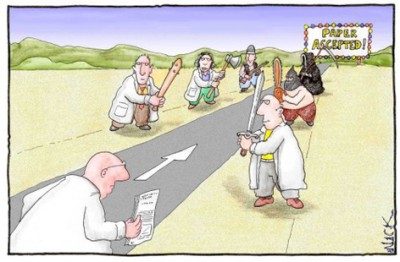What is peer review?

Peer-reviewed articles have been evaluated and critiqued by researchers and experts in the same field before the article is published. An author can then revise the article to make corrections and include suggestions that will make the article stronger, such as incorporating previously overlooked ideas and addressing other concerns. If the author cannot or will not take the peer reviewers' advice, the article may be rejected (not published) due to poor quality: nonscientific experiments, faulty logic, omitted facts, bias, incomplete conclusions, etc.
Peer review ensures that an article-and therefore the journal and the scholarship of the discipline as a whole-maintains a high standard of quality, accuracy, and academic integrity. When you consult peer-reviewed sources, you are tapping into a wealth of established, verified knowledge.

